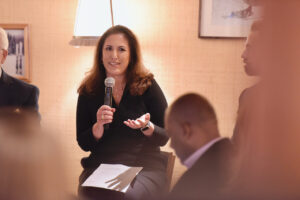A few weeks ago, I was thrilled to be on a panel during #UNGA79 in NYC on creating inclusive post-secondary experiences.
Hosted by Texthelp, this event brought together governments, civil society, international NGOs, and the private sector, and we discussed action plans to create more accessible and inclusive experiences across three key areas: primary & secondary education; higher education; and workplaces.
Three take-aways:
Here were the three take-aways I shared on how postsecondary institutions better integrate support systems to address challenges such as social media impact, neurodivergence and mental health – which can be adapted to K-12 as well:
1. Be proactive in helping students develop daily habits and routines. We assume students have basic executive functioning skills when they do not, and the lack of systems often impacts academic success and their mental health and well-being, and also directly impacts student retention.
Remember: There are so many places and spaces where unnecessary rigidity is mistakenly equated with academic rigor. If our goal is to support student development to become engaged, curious and values-driven members of our greater communities, we need to step back and evaluate how we are supporting that growth.
2. Provide better avenues for connection and mental health support. During the pandemic, Harvard researchers found 61% of Americans ages 18 through 25 self-reported being lonely frequently,almost all of the time, or all of the time, compared to 24% of Americans ages 55 through 65. A 2022 research study from the National Institute of Health found that among college students: “… the magnitude of loneliness was higher among the first-year student group, female students, students with poor economic status, and those who smoked and lived in dormitories.”
 Many students today struggle with what some of us mistakenly believe are basic and self-evident social skills. They can arrive on campus with fewer social skills, and then feel lonely and isolated when they do not feel connected.
Many students today struggle with what some of us mistakenly believe are basic and self-evident social skills. They can arrive on campus with fewer social skills, and then feel lonely and isolated when they do not feel connected.
Remember: making and maintaining friendships require executive functions.
3. Expand career services to focus more on executive functioning skills that support career development. As part of the research for my latest book, Erasing the Finish Line, I went back and revisited my students from 10-15 years ago – many of whom said they used the skills they learned in my office in their job search and at their jobs today.
So much of navigating work and life goes beyond the resume, job interviews and placement and highlights the ability to adapt, manage upwards, organize, plan, prioritize, start and complete tasks and be adaptable when things don’t go as planned.
Links of interest:
The Ultimate School Blueprint (for middle school and high school students + families)
The College Success Workshop (for college students + families)
Lighthouse parents have the most confident kids (Atlantic)
Surveillance parents face the ultimate firewall – freshman year (WSJ)
California bans legacy preferences at private universities (NYTimes)

